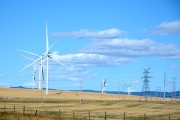The recent renewable energy procurement in Alberta has garnered much well-earned hype. It delivered wind power at prices that are a record low for Canada at an average price of $37/megawatt hour – cheaper than natural gas. It will deliver reliable power to Albertans, protect from future electricity price increases, and bring investment and revenue to rural communities where projects will be developed.
But shock at the price — with the crowd at the announcement literally gasping at the number — shouldn’t have been the case. The procurement process was well-designed with competitive bidding to deliver the lowest prices; nothing unknown or magical. Now, Albertans should understand what happened — why it came as such a shock to the experts and naysayers whose expectations and predictions were so off the mark.
Inaccurate predictions are hardly unique to Alberta. There are examples of forecasts from around the world and across industries that missed these trends. Experts at the International Energy Agency have consistently under-forecasted renewables growth for over two decades, each year nudging their forecasts up, only to have to repeat the process the following year when actual growth far surpasses their expectations.
We expect trends to happen slowly when they are often exponential. Experts’ predictions are heavily influenced by their experience of the past, as well as dubious reasoning in cases where incumbents stand to benefit from forecasts that show an overall continuation of the status quo. It’s in their interest to perpetuate myths about renewables as too expensive to a willing audience conditioned to view action on climate change as a partisan issue.
But in this case, data was available. The prices Alberta achieved are actually in line with the global trend in wind pricing and aren’t setting any global records. The real shock should be not at how low the prices are, but how far off experts were in their predictions (which went as high as $100/Mwh) when there was so much data on global pricing that said otherwise.
The failure to consider that the future will be different from the past can have real costs. Here, the damage was relatively minimal. Perhaps we could have moved more quickly to deploy renewables in the province but Alberta is catching up.
The real risk comes in missing similar trends in large parts of the economy. These require real predictions for the future. Nothing is certain, but predictions from McKinsey that peak oil demand will come as early as 2025, along with growing announcements from countries, including China and India, around plans to ban combustion engines in the first half of the century should give us pause when considering how quickly global oil demand could change.
The global commitment to address climate change as ratified in the Paris Agreement represents a significant challenge and opportunity to a fossil fuel-based economy such as Alberta’s. Yet, a surprisingly large amount of our political and business discourse seems a decade out of date. Too often it assumes we are just one more fossil-fuel boom away from returning to a business as usual that is never coming back.
We need to adopt a more global outlook. Alberta’s coal phase-out is consistent with what’s happening around the world. Renewables are the leading form of new electricity generation. High-cost and high per-barrel pollution oil will be at a disadvantage in the future.
We can check our tendency to assume things will continue in the status quo, or return to how they once were. What we know to be true from even a few years ago can be out of date when it comes to costs or technology. As any Canadian knows, we have to skate where the puck is going. Failure to do so could be more damaging in the future.
Second, we should do what we do best as Albertans — use our ingenuity to prepare our economy for future uncertainty to ensure that we have a healthy economy and good jobs. We have the skilled and educated workforce required, we have the knowledge, we have the experience in building new industries — we can’t afford to let visions of the past direct our plans for the future.
Sara Hastings-Simon is the director of the Pembina Institute’s clean economy program in Alberta.








